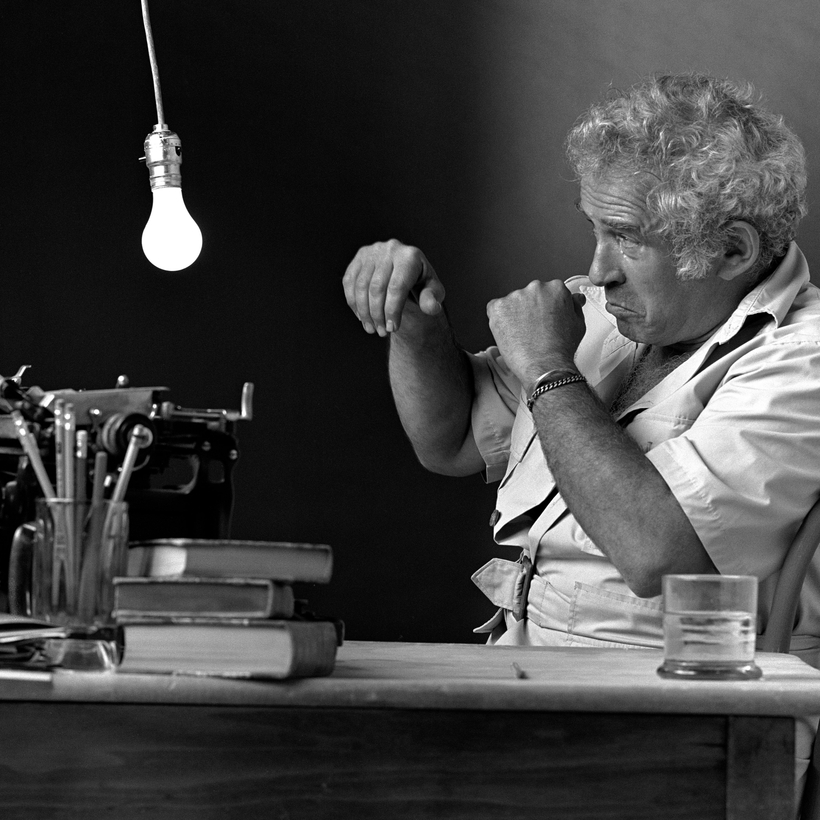“My experience with the Skyhorse team has been fantastic,” enthuses Alan Dershowitz in a testimonial on the Web site of the independent publishing house that released his latest volume, The Case for Vaccine Mandates. “They produced the book in record time before the scheduled date. It looks beautiful and is accurate in all respects.”
On the list of things for which an author might praise his publisher, speed in producing the physical product and accuracy in rendering its text would not seem to rank very high. But the prolific Dershowitz—patient zero for the extremely rare malady Dershowitzitis, the fear that someone, somewhere, does not know what Alan Dershowitz thinks about something—is not a typical author. Nor is Skyhorse a typical publisher.
In the past four years alone, the emeritus Harvard Law School professor, defense attorney on Donald Trump’s team, and graphomaniac has published a staggering 10 books with Skyhorse, a number that does not include editions of the Constitution, the Mueller report, and The Federalist Papers, for all of which he supplied introductions. And he found the perfect partner in Skyhorse, which, though a small publisher by industry standards, churns out a huge number of books on a vast array of subjects, from Money Matters for Teens to George Washington and the Irish, The Ultimate Prepper’s Handbook, and The Star Spangled Buddhist.

Skyhorse’s spaghetti-on-the-wall strategy (its 20 imprints release roughly 750 books per year), combined with its lack of editorial scrutiny (included among its authors are Nixon-Trump dirty trickster Roger Stone and Dr. Judy Mikovits, who claims that the coronavirus epidemic was planned by pharmaceutical companies and global elites), has led critics to sneer that it is “a publisher of last resort.” But Skyhorse may also be on its way to becoming the publisher of choice for writers whose work is samizdat, thanks to the self-appointed commissars of our new, ever more censorious literary culture.
Last month, when Skyhorse acquired a collection of essays and other writing by Norman Mailer, it was the latest in a series of controversial titles to have been dropped by their publishers and subsequently snapped up by the independent house. In this case, it was reportedly the title of Mailer’s 1957 essay “The White Negro” that led a “junior staffer” at Random House to protest its publication. (A spokeswoman for Random House disputed this account, stating that the book was never under contract.) For Skyhorse president Tony Lyons, the decision to publish “one of the most dramatic, controversial, and enduring writers of his generation” was a no-brainer.
Skyhorse’s acquisition of a memoir by Woody Allen followed the same script. Grand Central, an imprint of the French publishing conglomerate Hachette, was set to publish Apropos of Nothing in April 2020 when Allen’s estranged daughter, Dylan, re-aired the accusation that Allen had molested her in the early 1990s, and objected to the publication of his book. Pressure mounted once Dylan’s brother Ronan, whose blockbuster exposé of Harvey Weinstein, Catch and Kill, was published by another Hachette imprint, announced he would no longer work with the publisher. Days later, dozens of Hachette employees staged a walkout in support of the Farrows, and the following day Hachette announced that it would drop the title. Within three weeks, Apropos of Nothing was on bookstore shelves under Skyhorse’s Arcade imprint.
Accusations that the writer Blake Bailey had sexually assaulted two women and behaved inappropriately with students while a middle-school teacher in the 1990s caused his publisher, W. W. Norton, to remove his heralded biography of Philip Roth from circulation while it was enjoying a run on The New York Times’s best-seller list in May 2021. (Bailey denied the allegations.) Again, in a matter of weeks, Lyons announced that Skyhorse would put out the paperback, e-book, and audio versions of the book.
For Skyhorse president Tony Lyons, the decision to publish “one of the most dramatic, controversial, and enduring writers of his generation” was a no-brainer.
For Lyons, what unites the Mailer, Allen, and Bailey books is not the individual character of the men who wrote them but their literary merit. This puts him at odds with those who insist that the art cannot be separated from the artist—or what the artist has been accused of. A publisher, he told me, ought not be “a judge, a jury, acting as a private investigator into what people do in their private lives.”
When asked how he would handle an uprising among his own staff akin to the kind that occurred at Hachette, Lyons says that Skyhorse employees “have a perfect right to voice their opinion. They even have, within reason, the right to protest and to assemble outside.” Indeed, surveying the current intellectual climate, Lyons believes strongly that we need more discussion about controversial subjects. “The idea that censorship of any kind and the improper use of words like ‘misinformation’ leads to distrust in the general media and actually backfires,” he argues. “Allowing legitimate dissent and allowing debate makes it possible for better arguments to succeed.”

Lyons’s publishing career stretches back nearly three decades. In 1995, he joined the independent firm Lyons & Buford, then owned by his father, Nick Lyons—an English professor and author of more than 20 books, many of them about his passion, fly-fishing—and became its president and publisher two years later. When I asked him how he came about his (some might say overly) latitudinarian publishing philosophy—Skyhorse released books both for and against Donald Trump’s impeachment, vaccine mandates, and mask wearing—Lyons fondly recalled growing up on the Upper West Side during the 1970s, in an atmosphere where “it was very common for people to have competing views on different things.” Argument was encouraged in the Lyons household, where, “to find a place to sit down, you had to move a few books.”
This permissive attitude sometimes goes too far. While everyone has a right to express an opinion, not every opinion is worthy of being given the imprimatur of a publishing house. Take, for instance, The Real Anthony Fauci: Bill Gates, Big Pharma, and the Global War on Democracy and Public Health. Written by longtime anti-vaccine activist Robert F. Kennedy Jr., it has sold more than 800,000 copies, Lyons says.
It has also been roundly criticized by medical experts. Lyons deflects this by pointing to the mainstream media’s fixation on Kennedy’s hyperbolic rhetoric, such as his recent comparison of vaccine mandates to Nazi Germany, which Lyons downplays as “offhand comments he made that people felt were insensitive.” Lyons also defends Kennedy’s book by stressing the “2,194 citations” in it, as if an inordinate number of footnotes were inherent proof of a book’s validity, when it’s just as often the mark of a crackpot. Though Lyons is coy about his own views regarding the efficacy of vaccines, declining to tell me whether he’s been inoculated against the coronavirus, he co-wrote an anti-vaccination book, Vaccine Injuries: Documented Adverse Reactions to Vaccines, in 2014.
While Skyhorse’s peddling of pseudo-science is lamentable, it is the price to be paid for living in a free society. “Some degree of abuse is inseparable from the proper use of every thing; and in no instance is this more true, than in that of the press,” James Madison wrote. The main problem with criminalizing “misinformation”—an increasingly popular idea among a wide swathe of the progressive left—is who gets to define it. It is not meant as an endorsement of R.F.K. Jr. to cite other controversial forms of speech—such as the Wuhan “lab leak” theory or the Hunter Biden laptop story—which were also derided as dangerous “misinformation” before being accepted as, if not true, at the very least plausible.
None of the authors Skyhorse has published have been threatened with government censorship. But then, neither did the McMinn County, Tennessee, school board “ban” Maus, despite some recent headlines to the contrary; bowing to parent pressure, it removed the Holocaust-themed graphic novel from the curriculum. But the main threat to freedom of expression and open discourse in America today comes not from the heavy hand of government, but rather from ourselves, in the form of media and tech companies that de-platform controversial voices in response to public pressure campaigns aimed at constricting others’ freedom to read, watch, and hear what they wish.
In such circumstances, a publishing house such as Skyhorse is to be cherished, conspiracy-mongering warts and all. I would much rather live in a society with room for a person like Tony Lyons, whatever his personal views about vaccines and however opportunistic his motives, than in one where the heterodox, the crankish, and the just plain crazy are silenced by our intellectual and moral betters.
James Kirchick is the author of The End of Europe: Dictators, Demagogues, and the Coming Dark Age. His next book, Secret City: The Hidden History of Gay Washington, will be published by Henry Holt in May

